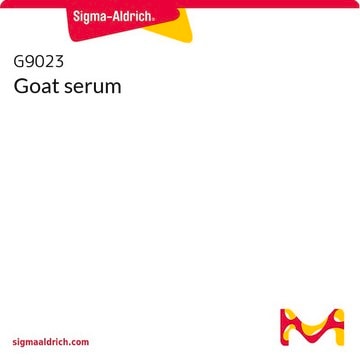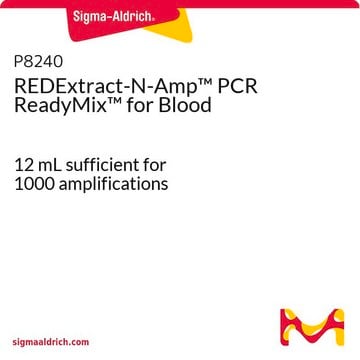推荐产品
生物源
mouse
品質等級
共軛
unconjugated
抗體表格
purified from hybridoma cell culture
抗體產品種類
primary antibodies
無性繁殖
ARAN1, monoclonal
形狀
buffered aqueous solution
物種活性
human, Xenopus, bovine, mouse, hamster
技術
immunocytochemistry: suitable
immunoprecipitation (IP): suitable
indirect ELISA: suitable
microarray: suitable
western blot: 0.5-1 μg/mL using total extract of Jurkat cells
同型
IgG2b
UniProt登錄號
運輸包裝
dry ice
儲存溫度
−20°C
目標翻譯後修改
unmodified
基因資訊
human ... RAN(5901)
mouse ... Ran(19384)
一般說明
Monoclonal Anti-Ran (mouse IgG2b isotype) is derived from the ARAN1 hybridoma produced by the fusion of mouse myeloma cells and splenocytes from BDF1 mice immunized with denatured recombinant human Ran. Ran is a small guanine trinucleotide phosphatase (GTPase) of the Ras superfamily that like other GTPases exist in two states: bound to guanine trinucleotide phosphate (GTP) or to guanine dinucleotide phosphate (GDP). The bound form is localized to the nucleus.
免疫原
denatured recombinant human Ran.
應用
Monoclonal Anti-Ran antibody produced in mouse has been used in:
- western blotting
- immunoprecipitation
- enzyme linked immunosorbent assay (ELISA)
- immunocytochemistry
生化/生理作用
Ran plays an important function in the directionality of nuclear transport. In this form it is important for the termination of the import reaction which is mediated by a complex of the cargo protein with importin-β and its adapter protein importin-α. The binding of RanGTP to importin-β causes the release of the cargo protein from the importin-α/importin-β complex. The import receptor (importin-β or transportin) is then exported out of the nucleus as a RanGTP complex and is released into the cytoplasm when RanGTP is converted to RanGDP by Ran-GAP1 (GTPase-activating protein). Export receptors respond in the opposite way by binding cargo with much higher affinity in the presence of RanGTP and exporting them out of the nucleus as RanGTP complexes. The exported cargo is released when Ran GAP1 converts RanGTP to RanGDP. In order to maintain the import/export cycle, Ran has to return to the nucleus. This is achieved by a small protein called nuclear transport factor 2 (NTF2) also known as p10, that binds RanGDP in the cytoplasm, and delivers it back into the nucleus. In the nucleus RanGDP encounters RanGEF (guanine nucleotide exchange factor) and undergoes nucleotide exchange to become RanGTP.
外觀
0.01M 磷酸缓冲盐溶液,pH 7.4,含 15mM 叠氮化钠。
免責聲明
Unless otherwise stated in our catalog or other company documentation accompanying the product(s), our products are intended for research use only and are not to be used for any other purpose, which includes but is not limited to, unauthorized commercial uses, in vitro diagnostic uses, ex vivo or in vivo therapeutic uses or any type of consumption or application to humans or animals.
未找到合适的产品?
试试我们的产品选型工具.
儲存類別代碼
12 - Non Combustible Liquids
水污染物質分類(WGK)
nwg
閃點(°F)
Not applicable
閃點(°C)
Not applicable
Protein import into nuclei: association and dissociation reactions involving transport substrate, transport factors, and nucleoporins
Rexach M and Blobel G
Cell, 83(5), 683-692 (1995)
SCF beta-TRCP controls oncogenic transformation and neural differentiation through REST degradation
Westbrook TF, et al.
Nature, 452(7185), 370-370 (2008)
Ran, a GTPase involved in nuclear processes: its regulators and effectors
Avis JM and Clarke PR
Journal of Cell Science, 109(10), 2423-2427 (1996)
The role of Ran in nuclear function
Azuma Y and Dasso M
Current Opinion in Cell Biology, 12(3), 302-307 (2000)
Masahiro Nagai et al.
FEBS letters, 585(5), 791-796 (2011-02-12)
The small GTPase Ran plays important roles in multiple aspects of cellular function. Maximal RanGAP activity is achieved with the aid of RanBP1 and/or presumably of RanBP2. Here, we show that RanBP1-knockout mice are unexpectedly viable, and exhibit male infertility
我们的科学家团队拥有各种研究领域经验,包括生命科学、材料科学、化学合成、色谱、分析及许多其他领域.
联系技术服务部门








